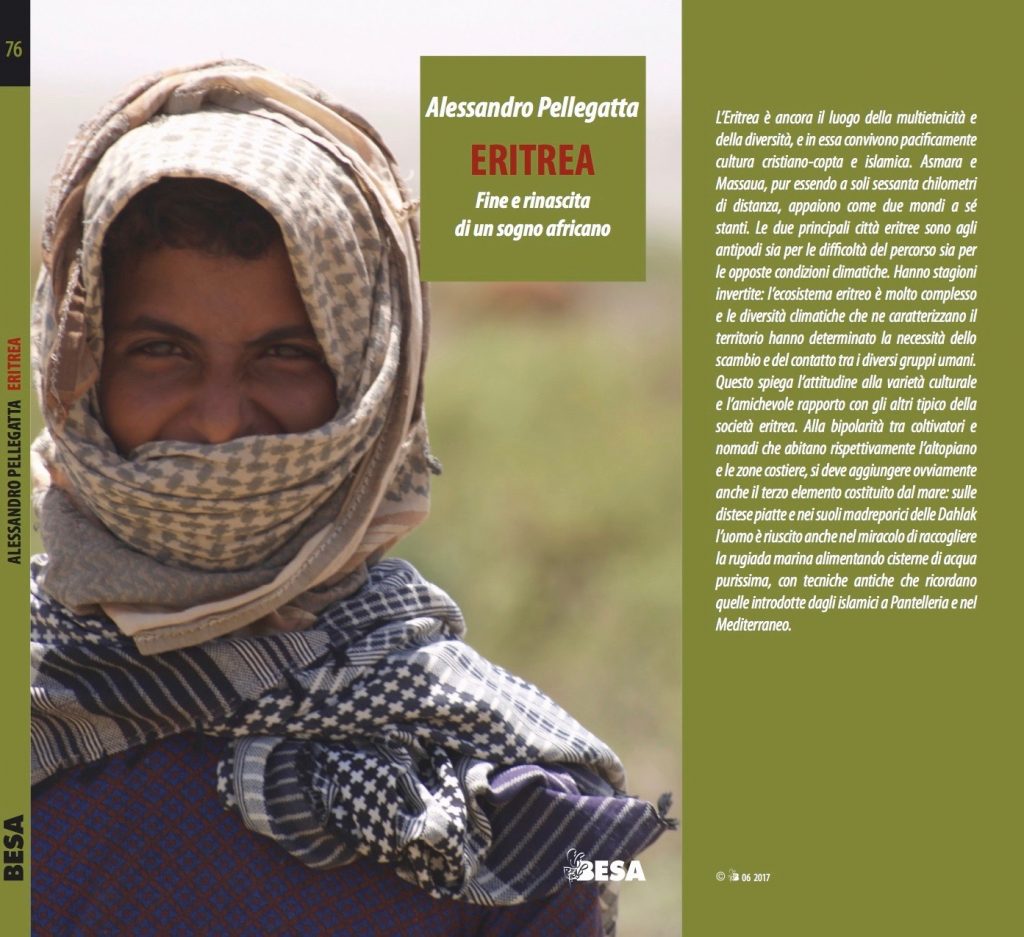By Alessandro Pellegatta
March 20,2018
Notes in the margin of the presentation of the book " Eritrea, end and rebirth of an African dream", (Besa publishing house). Verona, Friday 2 February, 8.30 pm, Sala Africa , Fondazione Nigrizia, vicolo Pozzo 1

Simone Weil said: "In the present we are all involved, the future is only in our imagination. Only the past is pure reality ".
We have lost the value of the past and of memory. And we are losing our roots and our history. Today, the media no longer speak about certain issues and certain countries, and therefore not knowing translates into an implicit removal of problems.
It is true, we are always connected. However, our main activity is not informing and knowing, but interrupting what we were doing. Feeding on fragments and immediacy thus becomes the daily condition of millions of distracted individuals and daffodils who live immersed in the constant partial attention of what goes around their ego.
The fruit of all this is the cognitive shipwreck in which the whole West is debated today.
To this is added, in addition to the phenomenon of fake news , also another equally disturbing aspect that has signaled Jean-Pierre Garnier, according to which now the current mass communication techniques in most cases are first and foremost exclusion techniques ( excommunication ), and lead to disinformation of citizens, covered by the avalanches of messages overthrown by the media.
Today in Italy we do not yet have a museum of exploration, and we have forgotten the history of our nineteenth century explorers and missionaries who, like Daniele Comboni, left us unforgettable pages, testimonies of life, memories, values and examples.
At the origins of the Italian colony of Eritrea there is an initiative of a former missionary, Giuseppe Sapeto, and a private shipping company of Genoa, the Rubattino, which has as its objective the bay of Assab, a small outpost south of the Sea Red. It is even an act of buying and selling between private individuals.
In those same years France had secured control of a portion of the Somali coast (Obock), while England, since 1839, had already firmly established itself in Aden.
Assab was a modest bay but had been identified by Sapeto for its proximity to the mythical Yemeni empori of Moka and Odeida, and could apply as a sea outlet to commercial traffic coming from Abyssinia, (Dancali permitting, that killed more than one Italian explorer) .
In 1882 the Italian State will take over from Rubattino formally, and always with a private act, while in 1885 Italian troops will disembark in Massawa with tacit English consent, while the conflict with the dervishes in Sudan is under way. The extremes of the Eritrean colony had been fixed.
Eritrea was named with this name on 1 January 1890.
Asmara was chosen as the chief town, in an eminent position on the plateau. The "primigenial" colony was born composite, both culturally and anthropologically, reflecting the same plurality and human wealth and of people of the Ethiopian empire to which Eritrea (though precariously) belonged.
The duality of the plateau - coastal lowland reflected two organizational models and two religions (the Coptic Christian and the Islamic) and two cities, Asmara and Massaua.
The name of Eritrea was chosen by Ferdinando Martini using the Greek and Latin name of the Red Sea, and in some respects this name respected the identity of a people that in the local version was called "Bahri" (people of the sea), to distinguish it from the people of the plateau. Another previous name was "Mareb Mellash", that is a country that lies beyond the Mareb, the river that has always divided Ethiopian plateau and Eritrean coastal areas.
The new name was the result of the Italian colonial design; yet, paradoxically, it has remained in the terminology and spirit of the Eritreans, who preserved it intact until the independence obtained after a long and bloody struggle for liberation (1961-1991).
And even Asmara, a city symbol of Italian colonialism, now entering the World Heritage Site has become an asset of all and the symbol of resilience and redemption of a people who are trying to design their own future starting from its colonial past, thanks to historical memory.
Another paradox: Eritrea is an example of how many African states are the direct successors of the European colonies, and basically how all the African nationalisms that fought for independence did so on the basis of the same geopolitics drawn by colonialism .
We therefore try to have more respect for the past and for the memory, and we try to analyze (and not remove) the Italian colonial experience. It will be very useful for us to understand our complex, difficult present, and to try to overcome the serious crises affecting the Horn of Africa and Libya.
Also because, as Marc Bloch wrote, misunderstanding of the present always and inevitably arises from the ignorance of the past. And we also try to have greater respect for the Eritrean people, which must be helped in this difficult moment.





